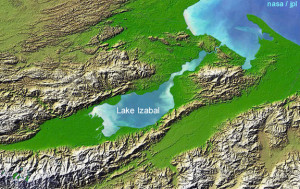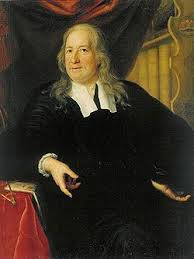Eddas
Lake Izabal
 Lake Izabal is the largest lake in Guatemala and nominated by at least two ‘researchers’ as the location of Atlantis. Duane K. McCullough has been a supporter of the Guatemalan site for a number of years(a). His views(b) are contained in his book, Spirit of Atlantis.
Lake Izabal is the largest lake in Guatemala and nominated by at least two ‘researchers’ as the location of Atlantis. Duane K. McCullough has been a supporter of the Guatemalan site for a number of years(a). His views(b) are contained in his book, Spirit of Atlantis.
An even more colourful advocate is the retired German schoolteacher, Joachim Rittstieg. On March 1st 2011 it was reported(c) that an expedition, sponsored by the German tabloid newspaper, Bild, and led by Rittstieg headed for Guatemala in search of the gold. Unfortunately all they found was a pot(e), following which Rittstieg managed to declare the expedition a ‘success’(d). Rittstieg has combined information he has gleaned from the Icelandic Eddas, Plato, Mayan calendars as well as oral sources and concluded that the capital of Atlan can be found submerged in Lake Izabal in Guatemala along with over 2,000 gold tablets(f).
The indefatigable Erich von Däniken(g) has added some support for Rittsteig’s claim of a sunken city in Lake Izabal although commenting that the treasure there is not gold, “just engraved messages from the past”!
(a) https://03a9ef9.netsolhost.com/duanemcc/index.htm
(b) See: (a)
(c) https://haecceities.wordpress.com/2011/03/10/atlantis-is-located-in-lake-izabal-guatemala-not/
(d) https://latino.foxnews.com/latino/lifestyle/2011/03/30/search-mayan-gold-bild-findsa-pot-stirs-outrage/ (offline April 2015)
(e) https://tcmam.wordpress.com/2011/03/07/bild-found-something-and-these-numbers-are-odd-thig-7/
(f) https://www.foxnews.com/lifestyle/cracked-mayan-code-may-pave-way-to-lost-gold
(g) https://tcmam.wordpress.com/2011/03/03/short-update-and-erich-von-daniken-thig-4/
Asgård
Asgård, according to Norse mythology contained in the Eddur (Eddas), was a city or country which was the home of the gods (Aesir). A number of researchers, such as the controversial Joachim Rittstieg have sought to link Asgard with Atlantis(a)(d). Daniel Fleck also hints at a possible connection between the two(b). Ignatius Donnelly in the first page of his book mentioned Asgard among a list of legendary places which included the Garden of Eden, Olympus and the Elysian Fields, as “representing a universal memory of a great land, where early mankind dwelt for ages in peace and happiness” in an Antediluvian world. Other writers, such as the late Walter Baucum, Jürgen Spanuth and Felice Vinci, who all locate Atlantis in northwest Europe, understandably associate Asgard with Atlantis.
Paul A. LaViolette has proposed “that Asgård, like Atlantis, represents the North American ice sheet” and “that the Bifrost bridge most likely signifies the ice sheet bridge that spanned Baffin Bay and the North Sea to connect the North American and Greenland ice sheets with the European ice sheet.” [432.250]
Since the end of the 19th century there have been regular claims of a link between the Indian Vedas and the Norse Edda(c).*In fact, it is also claimed that India has a cultural influence on ancient Egypt as far back as the 2nd millennium BC.*
(a) https://www.asgard-atlan.de/index-Dateien/AtlantisGB.htm
(c) https://odinicriteofaustralia.wordpress.com/odinist-cosmology-backed-by-science/
Rittstieg, Joachim *
Joachim Rittstieg (1937-2014) was born in Berlin and was a retired schoolmaster, although that bastion of truth and accuracy, Fox News Latino, describe him as a professor emeritus at Dresden University.
He spent six years with his family in Central America and after decades of study, he claimd to have decoded  all the Mayan calendars and published the results in 1999 in ABC der Maya[717]. Rittstieg combined information he has gleaned from The Icelandic Eddas, Plato, Mayan calendars as well as oral sources and concluded that the capital of Atlan, which he equates with Atlantis, can be found submerged in Lake Izabal in Guatemala. He also reveals that the sinking of the city took place on 30th October 666 BC. But there is more(a) the sunken city also has a cache of over 2,000 gold tablets on which the ‘Laws of Atlan’ are inscribed. Rittstieg wants someone to invest €3,000,000 in the recovery of this booty! I would expect the Guatemalan government would have something to say about such an operation.
all the Mayan calendars and published the results in 1999 in ABC der Maya[717]. Rittstieg combined information he has gleaned from The Icelandic Eddas, Plato, Mayan calendars as well as oral sources and concluded that the capital of Atlan, which he equates with Atlantis, can be found submerged in Lake Izabal in Guatemala. He also reveals that the sinking of the city took place on 30th October 666 BC. But there is more(a) the sunken city also has a cache of over 2,000 gold tablets on which the ‘Laws of Atlan’ are inscribed. Rittstieg wants someone to invest €3,000,000 in the recovery of this booty! I would expect the Guatemalan government would have something to say about such an operation.
He also claimed that the Maya and the Vikings had contact for nearly 500 years (754-1224 AD)(f).
A rather critical review of Rittsteig’s ideas by Swedish commentator can be read online(d) as well as another that is slightly more technical(e).
Coincidentally, Duane McCullough has also identified Lake Izabal as the location of Atlantis.
On March 1st 2011 it was reported(b) that an expedition, sponsored by the German tabloid newspaper Bild, led by Rittstieg had headed for Guatemala in search of the gold. Unfortunately, all they found was a pot, following which Rittstieg managed to declare the expedition a ‘success’(c)!
(a) Joachim Rittstieg – Wikipedia *
(c) https://www.foxnews.com/lifestyle/expeditions-quest-for-mayan-gold-finds-a-pot-stirs-outrage
(d) https://haecceities.wordpress.com/2011/03/10/atlantis-is-located-in-lake-izabal-guatemala-not/
(f) https://tcmam.wordpress.com/2011/03/07/the-zuyua-than-language/
(f) https://atlantisforschung.de/index.php?title=Joachim_Rittstieg
Rudbeck, Olof
Olof (Olaus) Rudbeck, (1630-1702), was a 17th century nationalistic writer from Uppsala, Sweden (a very powerful nation at that time). He was a professor of botany and anatomy,  and was one of two discoverers of the lymphatic vessels. He also had an interest in astronomy, taught mining and fortification theory and was Sweden’s first field archaeologist.
and was one of two discoverers of the lymphatic vessels. He also had an interest in astronomy, taught mining and fortification theory and was Sweden’s first field archaeologist.
Olaf published, Atlantica between 1679 and 1702, in Latin and Swedish [1646], , which placed Atlantis, not altogether surprisingly, in Sweden. This was a massive 2500 page work(b), published with the financial help of the Swedish King Carl XI, in which he offered 102 ‘proofs’ to support his thesis. Atlantica included a map showing Uppsala as Atlantis(a). He also contended that Swedish was the root tongue of all languages!
Rudbeck built his Atlantis theory on a number of details, including references to the Icelandic Eddas.
- He assumed that the mythical Swedish king Atle was the original Atlas,
- He linked the Swedish Atlefjell (Atle’s Mountain) with the Atlas Mountains and an old name for Sweden was Atland, which crops up in the Oera Linda Book,
- He cited Sweden’s large copper deposits as one of his proofs of his country’s identity with Plato’s Atlantis.
It is also of interest that Rudbeck was an early proponent of the idea that the ‘years’ referred to by Plato were in fact originally Egyptian ‘lunar cycles’ and concluded that Atlantis was destroyed circa 1500 BC.
Rudbeck also noted that the Greek word ‘nesos’ could mean ‘island’ OR ‘peninsula’, the latter being applicable to Sweden. He argued that the ‘Pillars of Heracles’ was a designation formerly used to refer to a number of locations. Rudbeck claimed that the Øresund strait between Sweden and Denmark was the site of the Atlantis ‘Pillars’.
It should be noted that Rudbeck’s theory was a development of the earlier ideas of another Swede, Johannes Bureus (1568-1652), a runic scholar, also born near Uppsala.
Half a century after Rudbeck’s death, a fellow Swede, Johannes Jacobi Eurenius, wrote Atlantica Orientalis[1320], published in 1751, in which he placed Atlantis in the Holy Land and argued forcefully against Rudbeck’s Swedish location.
*However, another two centuries were ro pass before a comparably comprehensive study of the Atlantis question was undertaken by Ignatius Donnelly. The passage of time has demonstrated both to be heavily flawed.*
In recent years, Gunnar Eriksson, professor emeritus of the History of Science and Ideas at Uppsala University, published the first Swedish biography of Rudbeck. He also compiled a shorter version, in English[529], that looked at Rudbeck’s 17th century ‘proofs’ that Sweden was Plato’s Atlantis. David King of the University of Kentucky has published[530] a further look at this remarkable, if eccentric, individual.
Stephen P. Kershaw has commented[1410.193] that Rudbeck’s Atlantica ”was written while Lutheran Sweden was still coming to terms with the abdication in July 1654 of ‘Queen of the Swedes, Goths and Vandals’, and her conversion to Roman Catholicism. For the Protestant Rudbeck, the Atlantis project was part of an attempt to champion Swedish nationalism, both politically and religiously; annexing Atlantis, which the Catholic/Mediterranean world had so often used to assert its own supremacy, and moving it to Protestant Sweden was an ingenious move.”
A modern review(c) of Rudbeck’s work by Magnus Alkarp, another Swede, has offered a more generous assessment of his methods, finishing with the following comment – “But leaving aside these dreams of Atlantis, we can simply state that Rudbeck’s hypotheses were rarely aimless fragmentary ideas, thrown out at random. On the contrary, when he combines antiquarian observations with topography, local folklore and written sources Rudbeck becomes a figure of genius – even when he is completely wrong.”
Alfred Nobel, the inventor of dynamite and after whom the annual Nobel Prizes are named, was a direct descendant of Rudbeck.
(b) https://www.journals.uchicago.edu/doi/abs/10.1086/358528
>(c) http://magnus.alkarp.se/essay/the-amazing-discovery-of-atlantis/<
